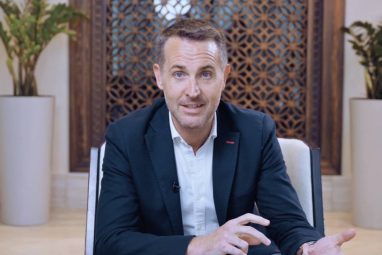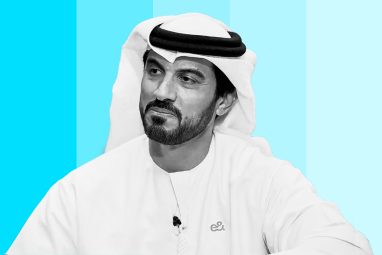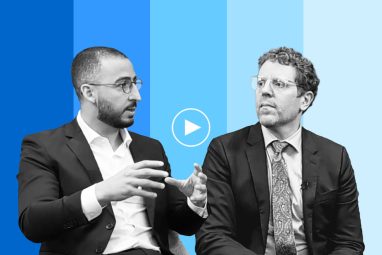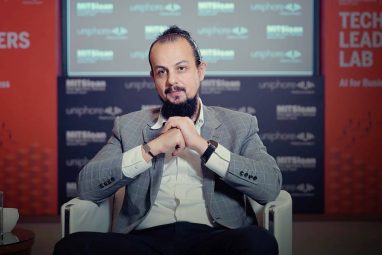What to Read Next
- CERN and Pure Storage Partner to Power Data Innovation in High-Energy Physics
- Lessons Learned From Outside Innovators
- CyberArk Launches New Machine Identity Security Platform to Protect Cloud Workloads
- How Emerging Technologies are Transforming Collaboration in the Middle East’s Construction Sector
- Why Cloud Security Is Breaking — And How Leaders Can Fix It
- IBM z17 Mainframe to Power AI Adoption at Scale
Salvador Anglada of e& enterprise discusses how the company supports organizations in setting sustainability goals, measuring impacts, and utilizing AI to enhance and accelerate their efforts.
It’s important to set sustainability goals from the outset, not as an afterthought but as a core part of a strategic framework. Start by defining what success in sustainability means for your organization. Is it reducing emissions? Enhancing efficiency in supply chains? Stabilizing resource use? Once you have that clarity, align your AI strategies to those targets.
Then, focus on data as the backbone. Data is essential; it drives the success of AI initiatives. Companies should invest in reviewing , structuring, and integrating their data to ensure it’s usable and effective for AI applications. Fostering a culture of innovation and openness to change is key. Organizations should train and educate their teams, helping them adapt to new processes and tools that integrate sustainability goals with AI-driven strategies.
In this exclusive web series, Salvador Anglada, CEO of e& enterprise, says sustainability should not be seen as separate from other business goals but intertwined. By embedding AI into every layer of operations—from predictive maintenance and smart energy use to AI-powered customer experiences—you create a comprehensive approach supporting business growth and sustainable practices.
Transcript
Liji Varghese: Let’s start by understanding AI’s role at e& enterprise today.
Salvador Anglada: Well, for us, AI is thought to be one of the areas that is expanding significantly. We have created an independent unit. We have more than 50 people working—data scientists and engineers—in that role. We have already deployed more than 200 models and 250 use cases.
Now, we’re putting a lot of emphasis on traditional AI and GenAI, which is the big thing. We have created a bigger center of competence on that specific front. We’re building use cases for different industries that are ready to enhance the way that the customers get the services and improve the experience. So the whole company, I would say, is fully focused on that.
We even created an academy to educate our customers and professionals on how to use AI. We see that we are only at the beginning of something that will be very big.
We are also embedding the ones we have deployed in our services. We have deployed AI-augmented services like preventive maintenance and smart city services. So, I would say it’s embedded in all that we are doing, in what we are serving, and in all services we provide to our customers.
Liji Varghese: This is what e& enterprise does right now. You might have a perspective on other companies’ operations within the Middle East. Could you share something about that with us?
Salvador Anglada: Other companies are doing, well, I would say maybe similar things like us.
But it’s important that the region, the countries, and the focus of the government (the UAE) are on AI. You see something that is very unique. The UAE appointed the first AI minister… three or four years ago. The 2031 agenda, the UAE agenda, AI, you know, the verticals in all the activities of the country to boost. Amazing investment is happening to create GCC, and specifically the UAE, as a hub for AI. And that means investing in infrastructure, in clean energy…
We have Falcon, one of the large language models, the most advanced in Arabic. The economy is expected to grow or contribute to AI. Based on what happens in five years, the contribution to the economy will be 10% of the GDP. So, an amazing movement is happening here, creating a fantastic ecosystem.
We then have companies like e& enterprise. We are helping all the companies, private companies, and the government boost and create the value that AI will provide to their own services.
Liji Varghese: Your company was also one of the many that had appointed a Chief AI officer (early on).
Salvador Anglada: You’re totally right. We have the minister, and now we have a Chief AI officer. From a telco perspective, enterprise is the management and professional services that help others. We’re quite advanced, introducing AI in all our services—on the customer side, in the way that we are operating our services, our network, in the way that we are preventing, for instance, predicting the potential fault in the future. So, there is also a big learning happening inside the telco that it’s quite valuable to try to expose to third-party customers.
Liji Varghese: When we talk about AI technology, sustainability is also a very important topic that we need to understand. What practices do you employ at e& enterprise?
Salvador Anglada: Here again, what we have is, first of all, as a company, e& is a pioneer in declaring our objectives in sustainability; we did it two years ago. We want to have net zero emissions in scope 1 and 2 by 2030. And it’s well advanced.
Also, we have clear goals and actions and at the same time supporting our customers in their journey. What we’re trying to help with is fixing their targets on the sustainability side.
We help them understand and discover which target they should have. Then, we go on the journey with them, helping them measure the activity and impact they need to have. Also, we have solutions that will help them reduce their emissions, improve their supply chain, and, in general, meet the target that they are helping.
We call it sustainability as a service.
AI can also amplify and accelerate the effect of all that they want to achieve. I wouldn’t want to be very specific, but we have services launched in the market that are helping all these companies to achieve all these goals.
One example is on the utility front: how the energy companies, for instance, are supporting customers with automating their consumption. What we have done with Gen AI is help them understand this information, compare consumption from now and in the past, predict what is going to happen, detect potential leakage, and, in general, help them to be much more efficient.
Exactly the same as with smart city services today, we help them manage how they collect waste, handle traffic, and manage parking. With AI, what we do is, again, amplify, predict, and help them reduce the consumption of petrol or energy in the buildings or even the way that they plan their routes to collect, for instance, waste.
All this is amplified today, and it’s helping a lot in savings, and in the end, it’s helping the economy. Sustainability is important because you are trying to reduce the consumption of energy all across your value chain.
Liji Varghese: When you consult with these organizations and companies, is there a specific challenge or challenges that you’ve encountered that these companies face today?
Salvador Anglada There are different challenges, some quite common. The first one is the data. In general, there is no AI without data because you need information to train models and create algorithms that allow you to provide outputs.
In many cases, this data does not exist or is located in (basically disintegrated on many levels). I mean, that’s the point. You have a lot of legacy. And the data needs to be reviewed. You need to take the data, structure it, and orchestrate it in a usable way.
Everybody first talks about sustainability from one side; they need to have goals. On the other side, they understand AI could be very valuable. Then, when they try to put these two things together, they say, Well, now we have this type of situation. Data and legacy systems are a big thing.
Implementation and cultural change are very important. It’s not that people don’t want to do them; you need to change your modus operandi. Once you have sustainability goals, when you have to change the processes, when you need to measure things, it takes time just to create that change and for people to understand that that goal exists.
I mean, the sustainability goals are happening in this part of the world, but they are coming from the top down, and drilling down to the bottom of the company takes quite a lot of time.
Liji Varghese: The trickling-down effect is much longer than usual.
Salvador Anglada: But it’s normal. That’s why technology sometimes takes time to be adopted. Everybody talks about AI, and AI is here, and it’s quite powerful. But adoption is the critical thing now.
Liji Varghese: So would you say organizations still have a lot to fix at the legacy level rather than jumping to Gen AI?
Salvador Anglada: I think you need to organize your layers. That’s it. It’s not that you don’t need to do it. You need to have clear goals. You need to understand where to get information. You need to invest in the right area, and you need to plan properly because things will not happen from one day to the next.
You need some time to implement all this.
Liji Varghese. If I had to ask you about the future of AI in supporting sustainable development goals, what would you say?
Salvador Anglada: I would say it will support, amplify, and accelerate big time. Let’s give some examples. I mean, I have 17 of them. I cannot go to all of them, but we can do a couple of them for now. One very clear example is climate change. Today, so many incidents are happening due to climate change.
Collecting the data, analyzing this data, predicting what is going to happen, and acting in advance. It’s a major initiative that will only happen because of AI. You can build up all these models that allow you to anticipate what will happen and reduce the impact to the environment.
And this is, for instance, one of them. Another one could be what we call safe cities or stable cities. We were talking one minute ago. All the technology will allow you to make sense of the text or collect all this information. All this information could be started, and then you can use this information to create more sustainable cities, which is one of the elements we were talking about. So if you think about all of them, one very important one is the growth—the future development and the future economic growth. I believe I was telling you the example of GCC: 10% of GDP will be because of AI. I would say this will happen all across. So more stable growth in the future, thanks to AI, will happen because it will be applied to some of our processes that we have and create additional opportunities for people.
Liji Varghese: If you had to advise these organizations on integrating sustainability into their AI adoption strategies, what would it be like?
Salvador Anglada: Well, start with clear goals. What do you want to achieve? You want to reduce the emissions. You want to stabilize supply chain resource management. What do you want to have? This is so critical because this will show you the future and the results that you’re going to have.
The second thing is about data. That’s what we were discussing. Let’s invest in data. Let’s prepare the baseline for the future. It will take a bit of time, but that will create additional value in the future. You try to jump directly into the solution without getting the proper data. Maybe you will waste your time.
Use the existing technology. Everybody talks about Gen AI, but I mean, you need it. It is fantastic. I mean, generate content. No, but I mean, traditionally, machine learning. It’s quite powerful.
Also, for safety and sustainability, because you can gather information, you can create algorithms, and output out of these algorithms. Use the combination of traditional AI and Gen AI. And maybe the last thing is, I believe, to use third-party companies and partner with people. Use an existing platform, a professional services company like ours, or others. We have the people, we have the knowledge, and we have the resources. And I think we can help a lot on this journey.
Editor’s note: This transcript has been edited for clarity and conciseness.









